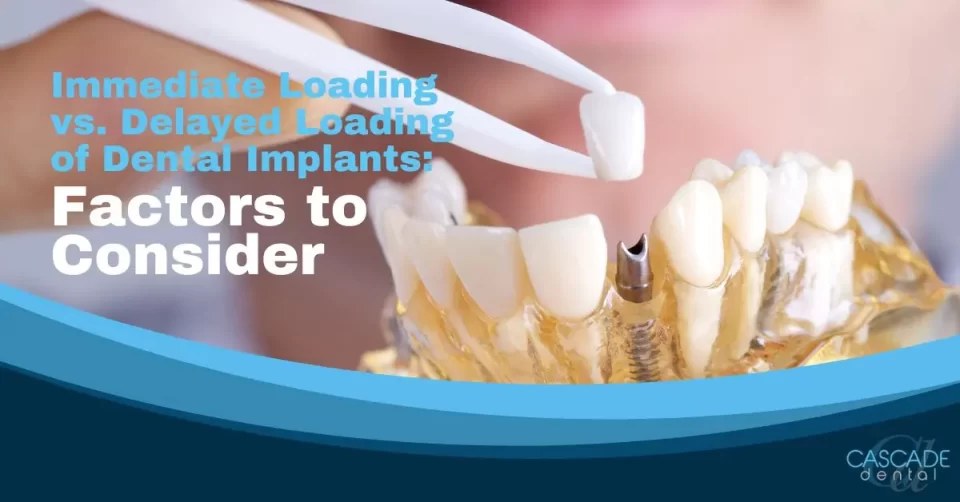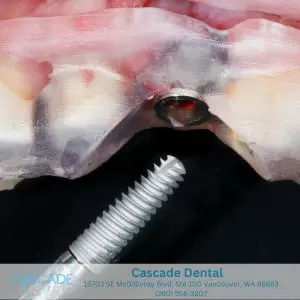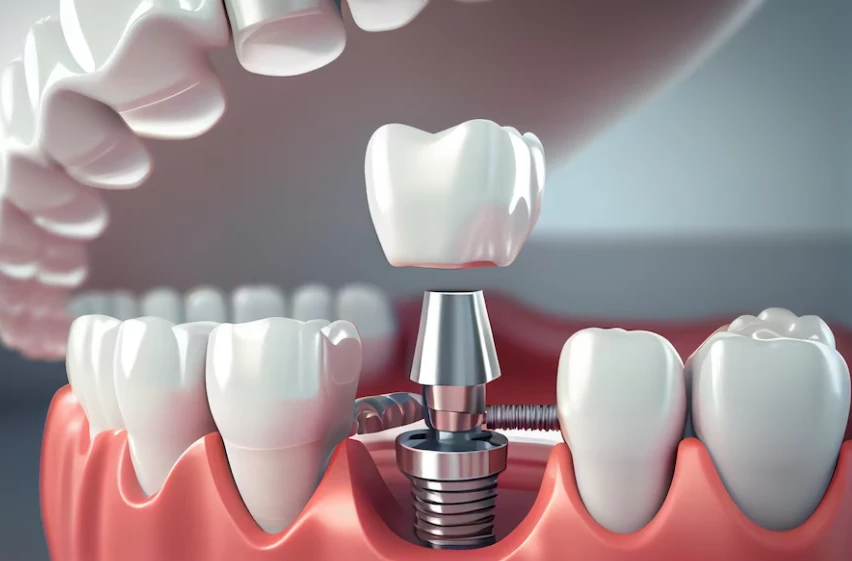Dental implants have revolutionized the way we approach missing teeth, offering a durable and aesthetic solution. However, when it comes to the timing of placing these implants, patients and dentists often grapple with a critical decision: immediate loading or delayed loading.

Immediate Vs. Delayed Loading: Which Is Safer?
Safety is a paramount concern in dental implant procedures. Immediate loading, where the dental implant and the crown are placed simultaneously, has become increasingly popular due to its convenience and quick results.
In contrast, delayed loading involves a waiting period, typically several months, after placing the implant before the crown is attached. This waiting period allows for osseointegration, where the implant integrates with the jawbone.
Historically, delayed loading was considered safer as it ensured complete healing and integration. However, advancements in dental technology and surgical techniques have made immediate loading a safe option for many patients.
The key is the quality of the jawbone and the implant’s stability during surgery. Immediate loading can be as safe as delayed loading for patients with strong, healthy jawbones.

How Long Does Immediate Loading Take?
One of the most appealing aspects of immediate loading is the speed at which patients can enjoy their new teeth. The entire process, from implant placement to attaching the provisional crown, can often be completed in a single dental visit. This is a significant advantage for patients seeking a quick solution to missing teeth.
However, it’s important to note that the provisional crown is typically temporary, with the permanent crown being placed after the implant has fully integrated with the jawbone.
Are There Risks With Delayed Loading?
When discussing the risks associated with delayed loading of dental implants, it’s crucial to delve deeper into the nuances of this procedure. Delayed loading, where there is a waiting period between the implant surgery and the placement of the crown, is often viewed as a safer route due to the time it allows for osseointegration. However, this approach carries its own set of risks that must be noticed.
The most significant risk during the waiting period of delayed loading is the potential for bone loss or deterioration. The absence of a tooth or implant in the jawbone can lead to resorption, a process where the bone begins to break down and lose density.
This weakening of the jawbone can adversely impact the ultimate stability and integration of the implant. The longer the jawbone remains without a tooth or implant, the more susceptible it is to such changes, potentially complicating future implant procedures.
Moreover, delayed loading typically necessitates multiple surgical procedures and dental appointments. Each surgical intervention carries inherent risks, such as the risk of infection, which can be compounded with each additional procedure. These repeated interventions can also lead to increased discomfort and longer overall recovery times for the patient.
Furthermore, the extended treatment timeline associated with delayed loading can be a significant inconvenience. It often requires the patient to endure a prolonged period with a missing tooth or a temporary prosthesis, which can affect their quality of life, self-esteem, and functionality regarding speech and eating.
What Factors Influence Loading Choice?
Several factors influence the choice between immediate and delayed loading. The most crucial factor is the condition of the patient’s jawbone. Patients with sufficient bone density and quality are often good candidates for immediate loading.
Other factors include the location of the implant, the patient’s overall health, and their ability to heal. Lifestyle and aesthetic considerations also play a role; some patients may prefer immediate loading for quicker aesthetic results.
The dentist’s expertise and comfort with either procedure also influence the decision. Immediate loading requires precise surgical technique and careful planning to ensure the implant’s stability, which not all dentists may be equipped to handle.
Can All Patients Opt For Immediate Loading?
Unfortunately, not all patients are suitable candidates for immediate loading. Those with poor bone quality, such as patients with osteoporosis or those who have experienced significant bone loss in the jaw, may not be eligible for this procedure.
Additionally, patients who have systemic health issues that slow down healing, such as diabetes or autoimmune diseases, may be advised to opt for delayed loading to ensure a better outcome.
Why Cascade Dental is Your Ideal Partner for Dental Implants
At Cascade Dental, we understand that choosing the right dental care provider is as crucial as the treatment itself. Our practice stands out as a leading choice for those considering dental implants, whether immediate or delayed loading. Here’s why we are your best choice.
Unmatched Expertise and Personalized Care
Our team of dental professionals boasts extensive experience and specialized training in implant dentistry. We are committed to staying abreast of the latest advancements in dental technology and techniques, ensuring our patients receive the most effective and safe treatments. At Cascade Dental, we don’t just treat teeth; we focus on each patient’s individual needs and preferences, providing personalized care that addresses your specific dental concerns and goals.
State-of-the-Art Facilities and Technology
Our clinic is equipped with state-of-the-art facilities and cutting-edge technology, which are vital for successful dental implant procedures. From advanced imaging equipment that aids in precise implant placement to the latest surgical instruments, our clinic ensures that your treatment is carried out with the utmost precision and care.
Commitment to Patient Education and Comfort
We believe in empowering our patients with knowledge. Our dental experts take the time to explain each step of the implant process, helping you make informed decisions about your dental health. Moreover, we prioritize your comfort and ease, ensuring a welcoming and stress-free environment during every visit.
Frequently Asked Questions
Q: How long do dental implants last?
A: Dental implants can last a lifetime with proper care and maintenance. Oral hygiene, lifestyle choices, and regular dental check-ups influence their longevity.
Q: Is the dental implant procedure painful?
A: We use effective anesthesia and pain management techniques to ensure your comfort during the procedure. Most patients report minimal discomfort, similar to a routine dental extraction.
Q: How long is the recovery period after getting dental implants?
A: Recovery times can vary, but most patients can resume normal activities within a few days. Complete healing and integration of the implant may take several months.
Q: Are dental implants suitable for everyone?
A: Most adults in good general health are candidates for dental implants. However, factors like bone density, oral health, and certain medical conditions can influence eligibility.
Take the First Step Towards a Confident Smile
Embarking on your journey to a healthier, more confident smile is just a call away. At Cascade Dental, we are dedicated to providing you with top-notch dental implant services tailored to your unique needs.
Contact us today to schedule a consultation and discover how we can help you achieve your desired smile. Your new smile awaits!


